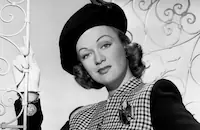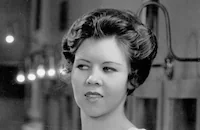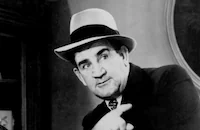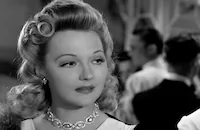Hit Parade of 1943
Brief Synopsis
Cast & Crew
Albert S. Rogell
John Carroll
Susan Hayward
Gail Patrick
Eve Arden
Melville Cooper
Film Details
Technical Specs

Synopsis
When amateur songwriter Jill Wright moves from the Midwest to New York City, she is dismayed to discover that Rick Farrell, the owner of Miracle Publishing Co., has claimed as his own the song she submitted to his company. Jill confronts Rick, who is a smooth-talking ladies' man, and he convinces her to ghostwrite songs for him to gain familiarity with the business. Unknown to Rick, Jill plans to copyright her songs in her own name and expose his double-crossing after his reputation has made the songs famous. Rick's life is complicated further by his surreptitious romance with singer Toni Jarrett. When Toni's boyfriend, influential club owner Bradley Cole, commissions Rick to write a new song, Rick and Jill receive the first test of their secret partnership. Their song is a hit, and they sincerely begin to fall in love--despite their intentions to use romance only as a means to keep each other in line. Soon their success leads to a new office for Miracle, and Rick decides to proclaim Jill as the author of their latest hit, "A Change of Heart," when the song makes the Hit Parade. He also intends for the announcement to be his wedding present to Jill, for he wishes to propose to her, but when Toni finds out, she tricks Jill into thinking that Rick means to marry her instead. Toni then confronts Rick, who tells her that they are through. Determined to ruin Rick's chance at happiness, Toni persuades Cole to ban "A Change of Heart" from his clubs, and when the song is not played any longer, it appears that it will not make the Hit Parade. Knowing that he needs only one more play of the song for it to hit the big time, Rick and his partner, J. MacClellan Davis, pawn their possessions and pledge ten thousand dollars for a war bond on a radio show offering to play song requests in exchange for pledges. Rick intends to announce Jill's authorship of the song after he performs it on the show, and while he prepares, Mac goes to Jill's apartment and explains the situation to her. Upon learning about Toni's treachery, and the fact that Rick intends to derail his own career for her sake, Jill rushes to the radio studio. She then tears up the speech that Rick intended to give and ends the song by kissing him.

Director
Albert S. Rogell
Cast

John Carroll

Susan Hayward

Gail Patrick

Eve Arden

Melville Cooper

Walter Catlett

Mary Treen

Tom Kennedy

Astrid Allwyn
Tim Ryan
Jack Williams

Dorothy Dandridge
Pops And Louie
The Music Maids
The Three Cheers
Chinita
The Golden Gate Quartette
Count Basie
Ray Mckinley
Freddy Martin
Wally Vernon
Warren Ashe

Addison Richards
Gary Breckner
Ken Niles
Bud Jamison
Grandon Rhodes
Paul Newlan
Nicodemus Stewart
Philip Van Zandt
Joey Ray
Cordell Hickman
Milton Kibbee
Earle Dewey
Olaf Hytten

Ernest Morrison
Edwin Mills
Madeline Grey
Hooper Atchley
Sally Cairns
Crew
Harold Adamson
Adrian
Nick Castle
Albert J. Cohen
Jeanne Darrell
Phil Ford
Frank Gill Jr.
Frances Hyland
J. C. Johnson
Russell Kimball
Jack Marta
Adele Palmer
Thomas Richards
Walter Scharf
Otto Siegel
Marlin Skiles
Jule Styne

Film Details
Technical Specs

Award Nominations
Best Score
Best Song
Quotes
Trivia
Notes
The viewed print was entitled Change of Heart, and as noted in the onscreen credits, was "revised" from Hit Parade of 1943 and re-released in 1949. Although cast members Jack Williams, Pops and Louie, The Music Maids and The Three Cheers were not listed on the credits of the viewed print, Republic records indicate that they were credited on the original release. The Variety preview review gives the picture's running time as 90 minutes, although other contemporary sources list the running time as 82 minutes. The following information comes from contemporary sources: Edmund Grainger was originally set as the picture's producer, and in March 1942, Barry Trivers was assigned to work on the screenplay. The extent of Trivers' contribution to the completed picture has not been determined, however. Republic first offered the leading roles to Milton Berle and Constance Bennett, but Berle declined the role in order to appear in a musical comedy on the stage. Anne Jeffreys, who was initially cast in a small role, was instead cast in the studio's picture Chatterbox. John Carroll was borrowed from M-G-M and Susan Hayward was borrowed from Paramount for the production.
According to a Hollywood Reporter news item, Republic held a nationwide contest for the worst song title. The winner, "Autumn Leaves in the Gutter, Never Again Will They Flutter," was submitted by W. F. McFadden, but it has not been determined if he actually composed the music and lyrics or only the title. In the film, the song is sung by "Westinghouse," who wants "Rick Farrell" to publish it. Another Hollywood Reporter news item stated that the film would be the "first picture to contain dim-out shots of New York City. It also will show Gotham as effected by gas rationing." These scenes were to have been filmed by director Al Rogell during a trip to New York City, but they were not included in the viewed print. The film received Academy Award nominations in the Music (Scoring of a Musical Picture) and Music (Song-"A Change of Heart") categories. Astrid Allwyn made her last film appearance in this picture, which was the third of Republic's "Hit Parade" films. For more information on the films, see the entry for The Hit Parade in AFI Catalog of Feature Films, 1931-40 (F3.1934).












